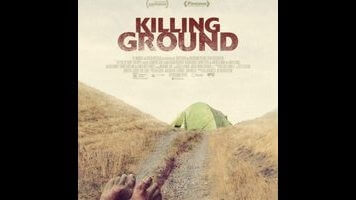Killing Ground is an especially brutal reminder to stay out of the woods

If, for some reason, decades’ worth of horror movies on the subject have yet to convince you that going out into an isolated area with no cellphone service alone and unarmed is a recipe for brutal murder, Australian writer-director Damien Power’s Killing Ground might be the deciding factor. Power’s guiding principle for the film seems to be realism, lighting it with flat, bright sunlight—no indie-movie blue and orange here—and shooting it with shaky handheld camerawork. He aims for realism in the film’s violence, too, depicting brutal assaults on men, women, and children (but especially women and children) with an unsettlingly impassive eye.
With all that in mind, it’s surprising that Power would opt for a fractured timeline with three different, overlapping narrative threads. But he did, in an ambitious move that turns out to be the film’s fatal flaw. We open with Sam (Harriet Dyer) and Ian (Ian Meadows), a couple on their way to spend New Year’s Eve—this is in Australia, remember, where Christmas and New Year’s are in the summer—in the blissful solitude of Sam’s favorite campground. On their way there, they stop off at a local bar, where Ian meets grizzled local German (Aaron Pedersen) in the parking lot. (He’ll come back into play later.) Sam and Ian are initially disappointed to see another tent at their campsite, but their disappointment turns to suspicion, and eventually concern, when their neighbors fail to materialize by the following morning.
This narrative is intercut with scenes of a family—dad Rob (Julian Garner), mom Margaret (Maya Stange), their teenage daughter, Em (Tiarnie Coupland), and baby son, Ollie—camping at that same riverside site, along with scenes of German and his equally decrepit pal Chook (Aaron Glenane) discussing some despicable act that would weigh heavily on both men’s consciences, were they smart enough to have them. Soon, it becomes clear that one of these timelines takes place several days before the other two, and from there on out it’s no longer a question of what’s going to happen (or has already happened, as the case may be). It’s also clear, thanks to context clues, who the victims will be, and where their deaths are going to take place. That leaves the “how” and the “why” of this inevitable act of sadism, and only the “how” is ever fully explored.
The film does contain a handful of moments of true shock, like a shot of baby Ollie stumbling bloodied and filthy through the woods that’s Texas Chain Saw Massacre-level disturbing. (And that’s a high compliment.) But given that it’s easy to predict what comes next once you realize how the film’s timelines work, Killing Ground is virtually suspenseless for the duration of its most harrowing scenes, as the people you suspected were going to die in terrible ways die in terrible ways, with some subtle, gut-churning intimations of sexual assault for extra impact. Things pick up later when the three storylines converge in spectacularly violent fashion, but even then the only real surprise is a misanthropic one.
Exacerbating the cruelty of it all is the fact that the motivations behind Chook and German’s backwoods murder spree are never explored. Power makes a few gestures toward a moral conflict in the character of Chook, but overall it’s simply assumed that they do these things because they’re bad, evil men. And so your potential enjoyment of—or repulsion for—Killing Ground comes down to what you want to experience in a horror movie. Granted, all this elaborately constructed savagery is upsetting, so the film succeeds on that level. But without suspense to propel it forward, and without a compelling backstory to deepen the intrigue, upset is all we’ve got.